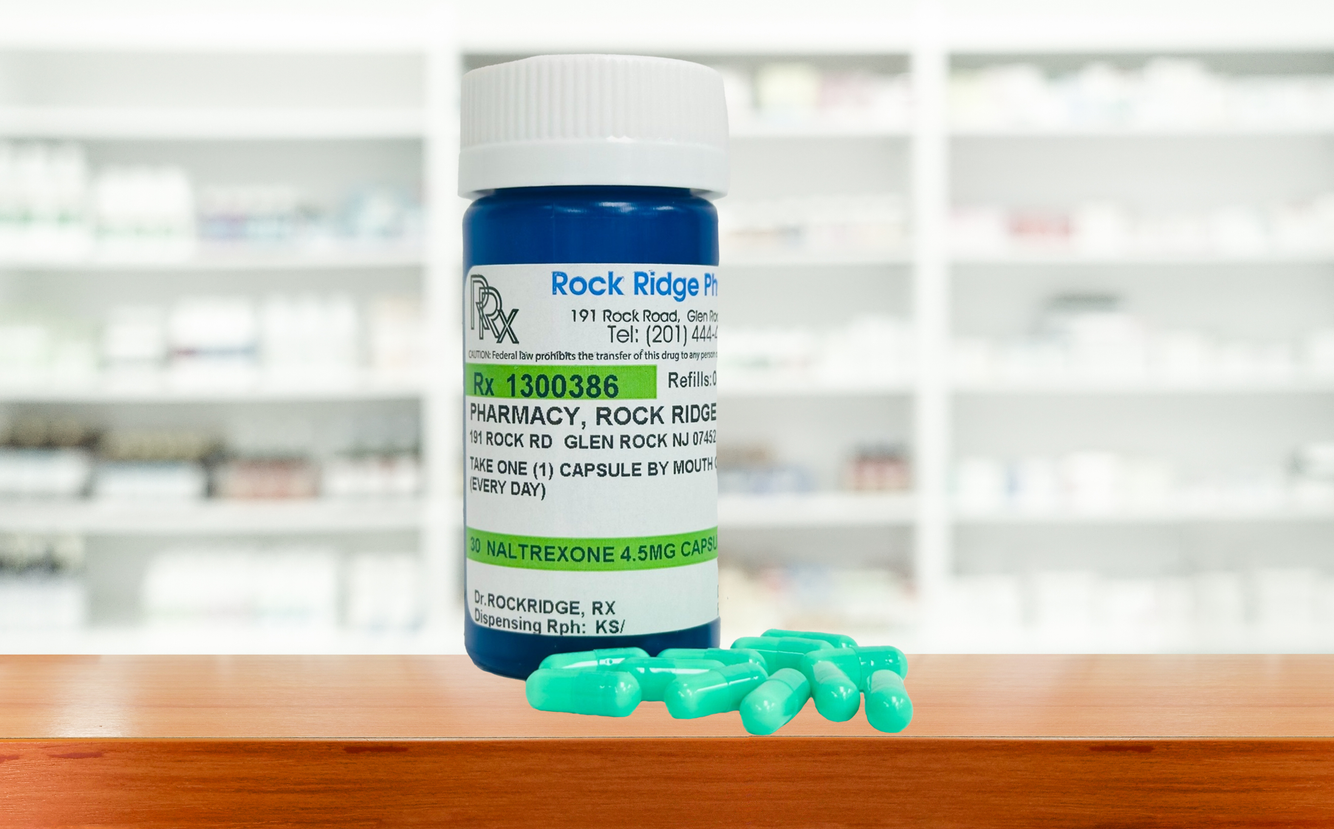A: LDN is a medication originally designed to treat opioid addiction at higher doses. At low doses, typically between 0.5 mg to 4.5 mg, it is used for its immunomodulatory and anti-inflammatory properties, particularly in autoimmune disorders, chronic pain management, and some neurological conditions.
Low Dose Naltrexone

What is Low Dose Naltrexone?
Low-dose naltrexone (LDN) is the use of naltrexone at doses typically between 1 mg and 5 mg, significantly lower than the standard dose used for opioid addiction treatment (usually 50 mg). LDN is a compounded medication that is used off-label for a variety of conditions, including autoimmune diseases, chronic pain, fibromyalgia, multiple sclerosis, and some neurological conditions. The proposed mechanism of action involves modulating the immune system and reducing inflammation by temporarily blocking opioid receptors, which may lead to an increase in endorphin production.
LDN Can Help to Treat Many Chronic Diseases
At Rock Ridge Pharmacy in Glen Rock, NJ we use custom, compounded Low Dose Naltrexone to help treat various chronic diseases, as well as chronic pain conditions. A LDN protocol can help to treat a wide variety of chronic disease and pain ailments such as:
- Hashimoto's disease
- Rheumatoid arthritis
- Irritable bowel syndrome
- Lupus
- Psoriasis
- Multiple Sclerosis
- Chronic Pain
- Fibromyalgia
- Cancer
- Crohn's disease
- Lyme disease
- Insomnia
Will I Experience Any Side Effects After Taking Low Dose Naltrexone?
Low-Dose Naltrexone (LDN) is used off-label for various chronic conditions and can have some minor side effects such as headaches or sleep disturbances. It's important to consult with a healthcare provider before starting LDN to discuss potential side effects and ensure it’s appropriate for your specific condition. To learn more about LDN check out our in depth resource page HERE. Rock Ridge Pharmacy and our compounding experts are here to help you on your journey to better health!
How Much Does LDN Cost?
The cost of Low-Dose Naltrexone (LDN) can vary based on several factors, including the pharmacy. Since LDN is compounded into low doses not typically available in standard form, prices can vary based on your personalized needs and changing outcomes. Our patients, hoping to buy Low Dose Naltrexone, will receive the best price possible and will have the opportunity to work with the leading compounding pharmacy in the area. At Rock Ridge Pharmacy, we are dedicated to providing high quality compounds at the most affordable prices.
How Do I Know What Dose of LDN is Right for Me?
Determining the right dose of Low-Dose Naltrexone (LDN) can vary based on individual factors, including the condition being treated, your response to the medication, and any side effects you may experience. Here are some general steps to help determine the appropriate dose
Consult with a Healthcare Provider:
Medical Evaluation: A healthcare provider will evaluate your medical history, current condition, and any other medications you are taking.
Starting Dose: For many conditions, a common starting dose is 1.5 mg to 2 mg per day. This can be gradually increased based on your response and tolerance.
Adjustments: The dose is typically increased by 0.5 mg to 1 mg every 1-2 weeks until the optimal dose is found, usually between 3 mg and 4.5 mg per day.
Monitoring and Feedback:
Track Symptoms: Keep a detailed log of your symptoms and any side effects you experience.
Regular Check-ins: Regular follow-ups with your healthcare provider will help determine if the current dose is effective or if adjustments are needed.
Individual Variability:
Response Variability: Everyone responds differently to LDN, so the process of finding the right dose may take some time.
Side Effects: If you experience significant side effects, your healthcare provider may adjust the dose more slowly or suggest alternative dosing schedules.
Special Considerations:
Condition-Specific Dosing: Certain conditions might require different dosing strategies. For instance, some autoimmune conditions may respond better to different dosing regimens.
Concurrent Medications: Other medications you are taking can influence the appropriate dose of LDN.
Example Dosing Schedule:
Start Low: Begin with 1.5 mg per day for the first 1-2 weeks.
Increase Gradually: Increase by 0.5 mg every 1-2 weeks, monitoring for effectiveness and side effects.
Target Dose: Aim for a target dose of 3 mg to 4.5 mg per day, based on your response and tolerance.
It's essential to work closely with a healthcare provider and a pharmacy who is experienced in LDN to find the most effective and safe dose for your specific situation. Rock Ridge Pharmacy and our compounding experts are trained and knowledgeable on Low Dose Naltrexone Therapy. We have worked with countless patients, heard numerous success stories and helped patients in their journey to better health by making LDN accessible through local delivery, online pharmacy access, and complimentary LDN support and advocacy. To learn more about if LDN is right for you, please call us today to discuss your Low Dose Naltrexone protocol!
Ways to Send In Prescriptions
Rock Ridge Pharmacy is located at 191 Rock Rd, Glen Rock NJ, 07452
We are dedicated to offering specialized Low Dose Naltrexone (LDN) services tailored to your individual needs. Our team of knowledgeable pharmacists is committed to providing comprehensive support and guidance throughout your LDN journey. Whether you're seeking LDN for its therapeutic benefits in managing various conditions or exploring its potential off-label uses, we are here to assist you every step of the way.
A: LDN works by modulating the immune system and reducing inflammation through the temporary blockage of opioid receptors, which increases the production of endorphins and enkephalins—natural painkillers and mood enhancers.
Patients with various conditions including multiple sclerosis, rheumatoid arthritis, fibromyalgia, chronic pain, and certain mental health issues like depression may benefit from LDN.
A: Treatment starts with a low dose, often 0.5 mg, gradually increasing to a typical maximum of 4.5 mg daily, based on individual response and tolerance. LDN is available in various forms like capsules, oral solutions, or topical creams, customized by compounding pharmacies.
A: Side effects may include vivid dreams, insomnia, headaches, and gastrointestinal issues, but they are generally mild and temporary. Monitoring and communication with a healthcare provider are essential for managing any adverse effects.
A: The response varies significantly among individuals. Some may notice improvements within a few weeks, while others might need up to six months to evaluate the full benefits of LDN.
A: LDN should not be used concurrently with opioid pain relievers due to its opioid-blocking effects, which can lead to withdrawal symptoms and ineffective pain management.
A: Patients should discuss their full medical history, including any other medications, with their healthcare provider. It's important to consider potential interactions and the patient’s specific health conditions.
A: Providers typically monitor treatment through regular follow-ups, assessing symptom relief and side effects. In some cases, blood tests may be conducted to monitor specific health markers.
A: While growing interest and anecdotal evidence suggest benefits, more extensive clinical trials are needed to fully establish LDN’s efficacy across various conditions.
Blogs

Browse Our New Supplement Store
Our pharmacy has a brand new online store that has a wide selection of affordable and high-quality supplements! The right combination of supplements can help improve sleep, boost mood, prevent hair loss and so much more!





